Unit6知识点梳理-牛津上海版英语六年级下册
上海沪教牛津版英语六年级下册Unit 6 PE lessons
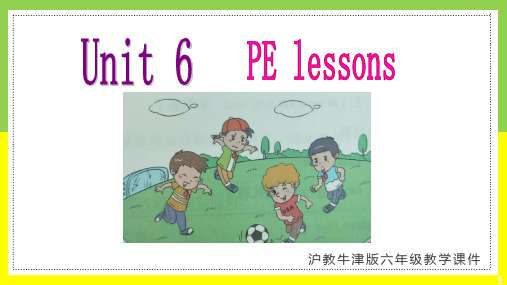
long race 长跑
short race 短跑
……………………………………………………………………………………………………………………………………………………………………
66
……………………………………………………………………………………… ………………………………………………………………………………………
……………………………………………………………………………………… ………………………………………………………………………………………
……………………………………………………………………………………………………………………………………………………………………
………………………………………………………………………………………………………沪……教……牛…津……版……六……年……级……教……学……课…件……… 1
8
……………………………………………………………………………………… ………………………………………………………………………………………
……………………………………………………………………………………………………………………………………………………………………
知识轻松 易 解
We do the long jump and the high jump.本句中的do为实义动词,意为“做”;do还可以做助 动词,我们一起来看看不一样的do究竟区别在哪里吧。
课文开心 易 学
Sometimes we play ball games. I like playing football, volleyball and basketball. 有时候我们玩球类游戏。我喜欢踢足球、打排球和打篮球。 My friends and I like playing sport. We have a lot of fun together. 我的朋友们和我喜欢做运动。我们在一起玩得很开心。
牛津英语上海版六年级下册知识点整理36435
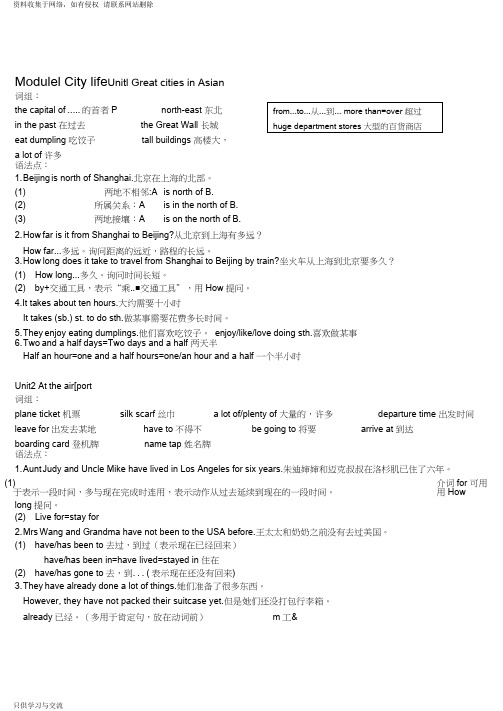
Modulel City life Unitl Great cities in Asian词组:the capital of ..... 的首者P north-east 东北 in the past 在过去 the Great Wall 长城 eat dumpling 吃饺子tall buildings 高楼大,a lot of 许多 语法点:1. Beijing is north of Shanghai.北京在上海的北部。
(1) 两地不相邻:A is north of B. (2) 所属关系:A is in the north of B. (3)两地接壤:Ais on the north of B.2. How far is it from Shanghai to Beijing?从北京到上海有多远?How far...多远。
询问距离的远近,路程的长远。
3. How long does it take to travel from Shanghai to Beijing by train?坐火车从上海到北京要多久? (1) How long...多久。
询问时间长短。
(2) by+交通工具,表示“乘..■交通工具”,用How 提问。
4.It takes about ten hours.大约需要十小时It takes (sb.) st. to do sth.做某事需要花费多长时间。
5. They enjoy eating dumplings.他们喜欢吃饺子。
enjoy/like/love doing sth.喜欢做某事6. Two and a half days=Two days and a half 两天半Half an hour=one and a half hours=one/an hour and a half 一个半小时 Unit2 At the air[port 词组:plane ticket 机票 silk scarf 丝巾a lot of/plenty of 大量的,许多departure time 出发时间 leave for 出发去某地 have to 不得不 be going to 将要arrive at 到达boarding card 登机牌 name tap 姓名牌语法点:1. Aunt Judy and Uncle Mike have lived in Los Angeles for six years.朱迪婶婶和迈克叔叔在洛杉肌已住了六年。
最新牛津上海版英语六年级下册全册复习资料
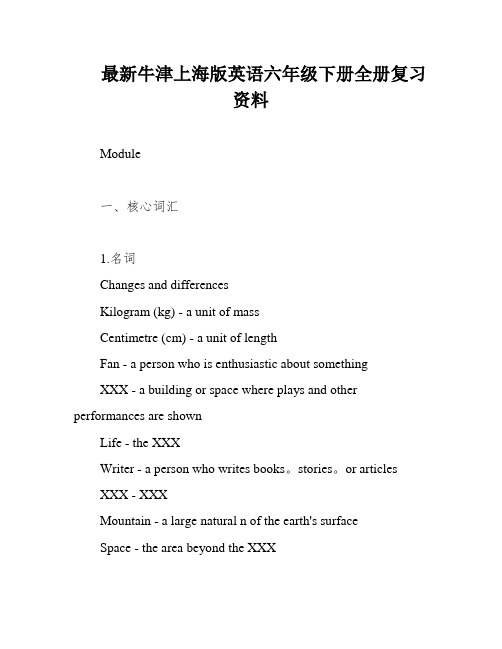
最新牛津上海版英语六年级下册全册复习资料Module一、核心词汇1.名词Changes and differencesKilogram (kg) - a unit of massCentimetre (cm) - a unit of lengthFan - a person who is enthusiastic about somethingXXX - a building or space where plays and other performances are shownLife - the XXXWriter - a person who writes books。
stories。
or articlesXXX - XXXMountain - a large natural n of the earth's surfaceSpace - the area beyond the XXX2.动词Weigh - to determine the weight of somethingDrive - to operate a XXXCarry - to hold or support something while moving3.其他Poor - XXXEven - used to XXX4.短语Street cleaner - a person who cleans the streets二、拓展词汇1.名词Photographer - a person who takes photographsFilm - a XXX flexible strip coated with light-sensitive XXX Broom - a long-XXX sweepingWife - a married womanFairy - XXXPS - postscript。
a note added to the end of a letter after the signatureDinosaur - XXX years ago2.动词Sweep - to clean a surface using a broom3.形容词- extremely goodDigital - XXX4.副词Online - connected to the。
上海牛津英语六年级第二学期知识点汇总
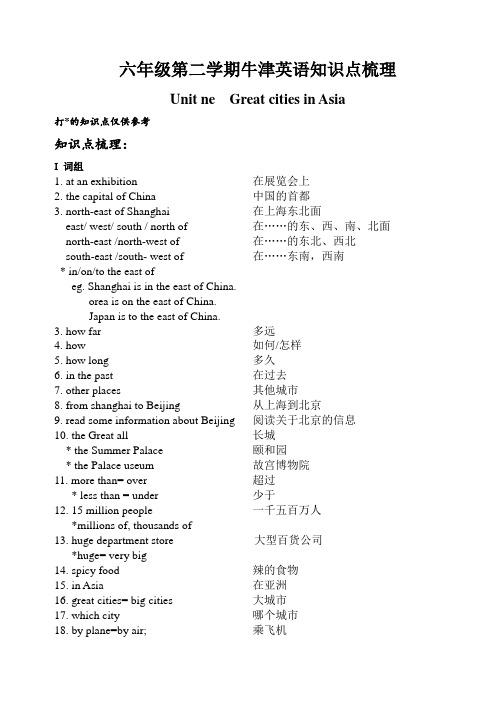
六年级第二学期牛津英语知识点梳理Unit ne Great cities in Asia打*的知识点仅供参考知识点梳理:I 词组1. at an exhibition 在展览会上2. the capital of China 中国的首都3. north-east of Shanghai 在上海东北面east/ west/ south / north of 在……的东、西、南、北面north-east /north-west of 在……的东北、西北south-east /south- west of 在……东南,西南* in/on/to the east ofeg. Shanghai is in the east of China.orea is on the east of China.Japan is to the east of China.3. how far 多远4. how 如何/怎样5. how long 多久6. in the past 在过去7. other places 其他城市8. from shanghai to Beijing 从上海到北京9. read some information about Beijing 阅读关于北京的信息10. the Great all 长城* the Summer Palace 颐和园* the Palace useum 故宫博物院11. more than= over 超过* less than = under 少于12. 15 million people 一千五百万人*millions of, thousands of13. huge department store 大型百货公司*huge= very big14. spicy food 辣的食物15. in Asia 在亚洲16. great cities= big cities 大城市17. which city 哪个城市18. by plane=by air; 乘飞机by ship=by sea; 乘船by train/ ferry 乘火车/ 渡轮19. That’s right. 对的。
Unit 6 第2课时 课文讲解及句型拓展-六年级英语下册(牛津上海版)
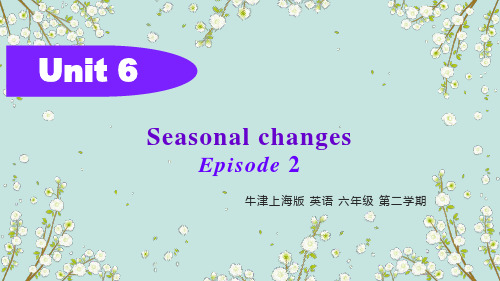
All students must wear red scarves.
Draw and write
C
With your classmates, draw your winter uniforms and write about them.
C
Look and write
Miss Wang is writing a notice about the summer and winter uniforms for all new students in Happy School. Look at the pictures carefully and help her finish the notice.
1
2
3
3-1
shirt
blouse
C
1
2
3
3-2
a pair of shorts
a pair of trousers
C
1
2
3
3-3
a dress
牛津英语上海版六年级(下册)知识点整理
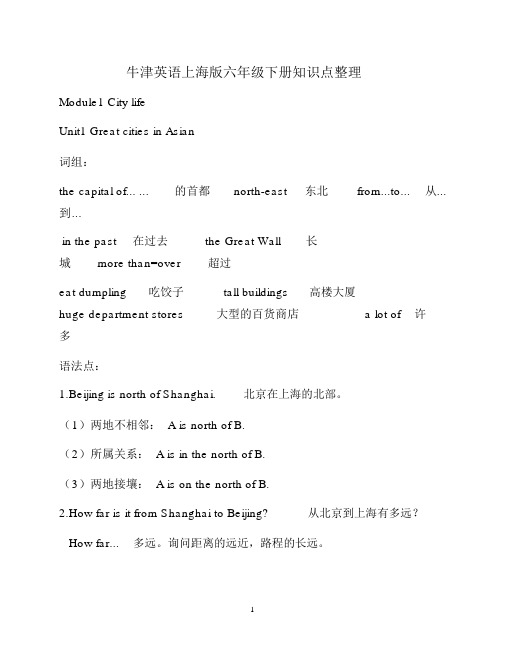
牛津英语上海版六年级下册知识点整理Module1 City lifeUnit1 Great cities in Asian词组:the capital of... ...的首都north-east东北from...to...从...到...in the past在过去the Great Wall长城more than=over超过eat dumpling吃饺子tall buildings高楼大厦huge department stores大型的百货商店 a lot of许多语法点:1.Beijing is north of Shanghai.北京在上海的北部。
(1)两地不相邻: A is north of B.(2)所属关系: A is in the north of B.(3)两地接壤: A is on the north of B.2.How far is it from Shanghai to Beijing?从北京到上海有多远?How far...多远。
询问距离的远近,路程的长远。
3.How long does it take to travel from Shanghai to Beijing bytrain? 坐火车从上海到北京要多久?(1) How long... 多久。
询问时间长短。
How long ⋯多长。
用于询物的问长度。
(2) by+ 交通工具,表示“乘 ...交通工具”,用 How 提问。
4.It takes about ten hours.大约需要十小时It takes (sb.) st. to do sth.做某事需要花费多长时间。
5.They enjoy eating dumplings.他们喜欢吃饺子enjoy/like/love doing sth.喜欢做某事6.Two and a half days=Two days and a half两天半Half an hour=one and a half hours=one/an hour and a half一个半小时Unit2 At the airport词组:plane ticket机票silk scarf丝巾 a lot of/plenty of大量的,许多departure time出发时间leave for出发去某地have to不得不be going to将要arrive at到达boarding card登机牌name tap姓名语法点:1.Aunt Judy and Uncle Mike have lived in Los Angeles forsix years. 朱迪婶婶和迈克叔叔在洛杉矶已住了六年。
2020-2021学年牛津上海版六年级下册英语unit6 语言点和同步默写(无答案)
Final Revision (6B)Module 2 Unit 6一、词性转换1. season n. 季节seasonal adj. 季节的2. change n. v. 改变,变化changable adj. 多变的3. air-conditioner n. 空调air-conditioned adj. 有空调的4. life n. 生活(不可数名词)life n. 生命(可数名词,复数为lives)5. 一些名词的复数形式sleeve (sleeves) notice (notices) blouse (blouses) butterfly (butterflies) snowman (snowmen) shoe (shoes)6. 以复数形式出现的一些名词长裤(trousers)短裤(shorts) 眼镜(glasses)剪刀(scissors)7. take“拿走”这一动词的三种形态take-took-taken二、语言点1. Miss Guo is writing a notice to all new students about their uniforms in summer.郭老师正在给所有的新学生写一份关于他们夏季校服的通知。
Write sth. to sb. about sth. 给某人写关于关于某事的东西Eg: Peter is writing a letter to his pen-pal about his school life. 彼得正在给他的笔友写一封关于他学校生活的信。
2. in early October 在十月上旬in late April 在四月下旬(1)1~12月的表达 January, February, March, April, May, June, July, August, September, October, November, December.(2)early 上旬late 下旬3. Boys must wear white shirts with the short sleeves, blue shorts, black belts, white socks and black shoes. 男生必须穿白色短袖衬衫,蓝色短裤,扎黑色腰带,穿白袜和黑鞋。
牛津英语六年下册第六单元知识点归纳与整理
第六单元知识点归纳与整理6 B Unit 6本单元的语法是一般将来时基本构成: 主语+ be动词+ going to do否定句: 主语+ be动词+ not + going to do一般疑问句: be动词+ 主语+ going to do?肯定回答和否定回答: Yes, 主语+ be动词. /No, 主语+ be动词not.特殊疑问句: (Who/whose/which…..) + 主语+ be动词+ going to do?on Saturday morning 在星期六早上sunny 名词形式sunchildren 单数形式childhave school 上学call sbo. or call+ 人名,打电话给某人(人称代词要用宾格)talk about their plans for the weekendtalk about sth. 谈论某事plan for sth. 为……的计划一些打电话的日常用语:你想要找某人听电话,可以说:May I speak to …? / May I speak with…?/ I would like to speak to…当你想问接听电话的人是某人时,可以说:Is that/this ....speaking?当你就是对方要找的人时,可以说:Speaking. / This is …speaking. /…speaking. 当你想告诉对方你是谁是,可以说:This is …speaking. / This is …当对方打错电话时,可以说:Sorry, wrong number.当对方找的人在时,可以说:Hold on, please.当对方要找的人不在时,可以说:Sorry, he/she is not here. May I take any messages for her/him?See a Beijing opera 看京剧(Beijing opera-京剧)Would you like to + 动词原形?-- 你想/愿意做。
沪教版六年级英语下册(上海牛津6B)知识点总结
lazy
懒惰的
take off
脱掉
roof
屋顶
yard
院子
hit
碰撞
see the world
见世面
one by one
一个接一个地
look out of
往外看
even
甚至
themselves
他们自己
sweep
扫地
space
太空
theatre
剧院
broom
扫帚
dinosaur
恐龙
go fishing
去钓鱼
drive
驾驶
a piece of
一张
enjoy oneself
玩得愉快
street sweeper
环卫工人
have a picnic
去野餐
get…in
收割
油
craft
手艺,工艺
long race
长跑
oil painting
油画
crown
王冠
short race
短跑
powerful
强有力的
scissors
剪刀
win
获胜
ink
墨水
tape
胶带
long jump
跳远
brush
画笔,刷子
glue
胶水
high jump
跳高
paints
绘画颜料
saw
锯
swimsuit
kilogram
千克,公斤
writer
作家
online
在线的
centimeter
厘米
photographer
上海版牛津英语六年级下册6B重点知识点复习整理
上海版牛津英语六年级下册6B 重点知识点复习整理Module 1 City LifeUnit 1 Great cities in Asia【知识点梳理】1.方位词: east / west / north / south / north-east / north-west / south-east / south-west用法: a. 两地不相邻 : e.g. A is north B.(=to the south of)b.两地接壤 : e.g. A is on the north of B.c.所属关系, A 包含 B, B 属于 A: e.g. B is in the north of A.2.by + 交通工具表示“乘 ,, 交通工具” , 用 how 进行提问e.g. by bus / ferry / train / ship / underground by plane = by air,⋯by ship = by sea3.How far ⋯多远(询问距离的远近,路程的长短)e.g. Hoe far is it from your home to school? 从你家到学校有多远?4.How long ⋯多长,多久(询问时间的长短,提问一段时间)e.g. How long does it take to travel from Shanghai to Beijing by train?坐火车从上海到北京要花多长时间?5. It takes (sb.) some time to do sth.做某事需要花费多少时间e.g. It takes me five hours to make this modal plane.做这个模型飞机花了我 5 个小时。
6.like / love / enjoy doing sth. 喜欢做某事e.g. The people in Bangkok like / love / enjoy eating spicy food. 曼谷人喜欢吃辛辣食物。
- 1、下载文档前请自行甄别文档内容的完整性,平台不提供额外的编辑、内容补充、找答案等附加服务。
- 2、"仅部分预览"的文档,不可在线预览部分如存在完整性等问题,可反馈申请退款(可完整预览的文档不适用该条件!)。
- 3、如文档侵犯您的权益,请联系客服反馈,我们会尽快为您处理(人工客服工作时间:9:00-18:30)。
六年级第二学期牛津英语知识点梳理
6B Unit 6 Seasonal changes
I. 补充词组
1.in spring/summer/autumn/winter 在春/夏/秋/冬
2.wear summer/winter uniforms 穿夏季/冬季校服
3. a school uniform 一件/套校服
4.in January 在一月(二月—十二月)
February/March/April/May/June/July/August/September/October/Novembe r/December
5.in early April 在四月初(上旬)
6.in late October 在十月末(下旬)
7.wear a red scarf 戴红领巾
8. a pair of socks/shoes 一双袜子/一双鞋子
9. a pair of glasses/trousers 一副眼镜/一条长裤
10.take some photographs of their school life 拍一些有关于他们的学校
生活的照片
11.an air-conditioner 一台空调
12.study in the air-conditioned library 在有空调的图书馆里学习
= study in the library with air-conditioners
13.before/after breakfast/ lunch/dinner 在早餐/午餐/晚餐之前/后
14.not many flowers/leaves 不多的花/叶
15.on the tree(s) 长在树上
16.in the tree(s) 在树上
17.help students keep warm 帮助学生保暖
18.help sb. (to) do sth. 帮助某人做某事
19.keep warm/clean/quiet 保持温暖/干净/安静
20.make a snowman 堆雪人
II.词性转换
1. season (n.) 季节→seasonal (adj.) 季节的
e.g. There are four seasons in a year.
Strawberries are seasonal fruit.
2. change (n.) 变化;找零/(v.) 改变;更换→changeable (adj.) 易变的,变化无常的
e.g. There are more and more changes in our country.
Here is your change, sir.
Please change the sentence into English.
The weather is very changeable in Tibet(西藏).
3. different (adj.) 不同的;有差异的→difference (n.) 不同;差异
e.g. Students like to wear different T-shirts in summer.
Can you tell me the differences between the two pictures?
4. short (adj.) 短的;矮的→shorts (n.) 短裤
e.g. In summer, the days are long and the nights are short.
Boys must wear T-shirts and shorts in summer.
5. life (n.) 生命(可数);生活(不可数) →lives (pl.) 生命(复数) →live (v.) 生活;居住
e.g. Jack saved Rose’s life, but he lost his.
He spends very little money in his daily life.
The farmer and his wife live happily in their hut and they enjoy their happy life very much.
6. condition (n.) 状况;条件→air-conditioner (n.) 空调→air-conditioned (adj.) 有空调的
e.g. The piano was still in good condition.
The library isn’t air-conditioned now because there is something wrong with the air-conditioner.
III. 语言点/句型
1. Miss Guo is writing a notice to all new students about their uniforms in
summer. 郭老师正在
给全体新生写一则有关夏季校服的通知。
write a notice to sb. 给某人写一则通知,此处notice是名词,意为“通知”。
notice是兼类词,也可以做动词,意为“注意”。
e.g. Sorry, I didn’t notice you.
2. All students must wear summer uniforms in September, early October, late
April, May and
June. 全体学生在九月、十月初、四月末、五月和六月必须穿夏季校服。
early +月份,表示“某个月份的月初/上旬”。
e.g. early April
late +月份,表示“某个月份的月末/下旬”。
e.g. late November
early/late是兼类词,既可以做形容词,也可以做副词。
e.g. get up early, come back late
3. Boys must wear white shirts with short sleeves. 男生必须穿白色短袖衬衫。
with是介词,意为“带着,具有”。
e.g. Girls must wear white blouses with long sleeves.
4. Peter and Kitty have taken some photographs of their school life in summer. 彼得和基蒂已经拍了一些有关他们的学校生活的照片。
此处life意为“生活”,是不可数名词。
e.g. Health is very important in our daily life.
life也可以意为“生活方式”,是可数名词。
e.g. He lives a happy life in the countryside.
5. Many flowers grow in the garden. 许多花朵生长在花园里。
此处grow是不及物动词,意为“生长;成长”。
e.g. The young trees grow well in the park.
grow也可做及物动词,意为“种植”。
e.g. He often grows some flowers in spring.
grow还可以做系动词,意为“逐渐变得”。
e.g. She is growing healthy.
6. Not many students like playing in the playground because it’s hot. 不多的学生喜欢在操场上玩耍,因为天气太热。
not many, not much意为“并非很多”,修饰主语,后跟可数/不可数名词。
e.g. Not many people want to do farming work now.
Not much time is needed to do it.
because是连词,引导原因状语从句。
e.g. John didn’t attend the meeting because he was ill yesterday.
7. Not many leaves grow on the trees. 不多的树叶长在树上。
on the tree(s) 意为“长在树上”,指原生的花、叶、果等。
e.g. Apples grow on the trees.
in the tree(s) 意为“在树上”,指外来的鸟、虫等。
e.g. Birds are singing in the trees.
8. What can you see in the garden? We can see many bees and butterflies flying around. 你们能在花园里看见什么?我们能看见许多蜜蜂和蝴蝶在到处飞。
see sb./sth. doing sth. 意为“看见某人/某物正在做某事”,强调动作正在发生且未结束。
e.g. I see many people swimming in the sea in summer.
see sb./sth. do sth. 意为“看见某人做某事”,强调动作的全过程已经结束。
e.g. We saw him play football this morning.。
